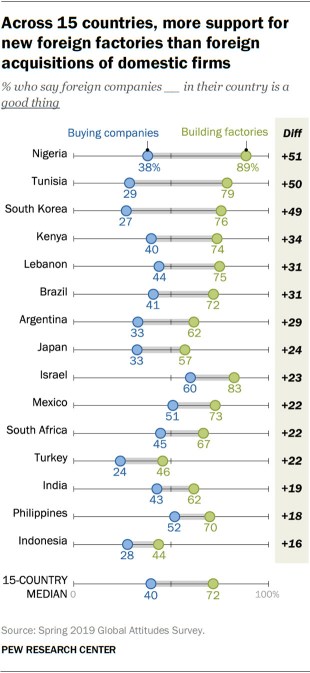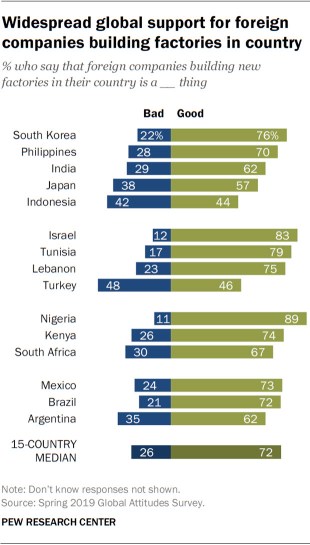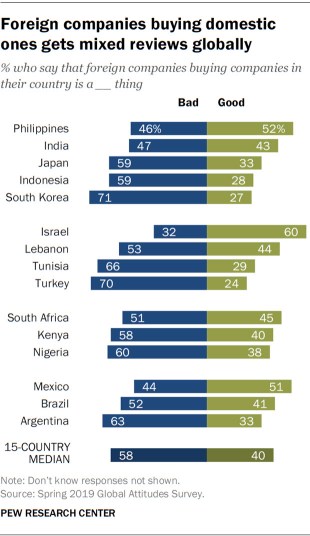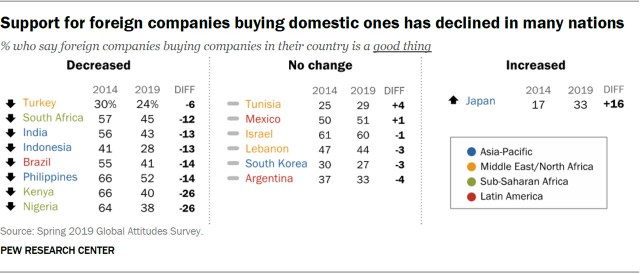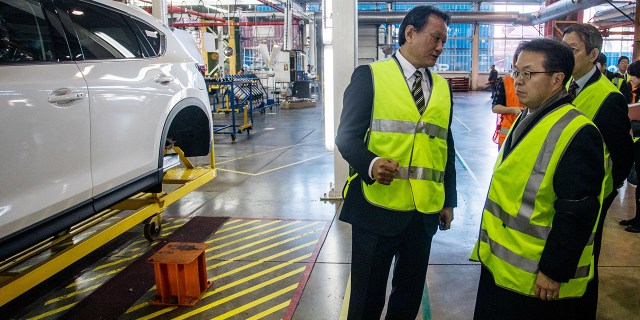
People in many countries are supportive of foreign companies building factories in their own nation. But they are more wary of foreign companies buying domestic firms, according to a Pew Research Center survey conducted in 15 nations in spring 2019.
The survey was fielded before the global spread of COVID-19, which is projected to lead to as much as a 40% decrease in foreign direct investment this year, according to the United Nations.
Across the countries surveyed in 2019, a median of 72% of adults said it is a good thing when foreign companies build factories in their nation, while 26% said it is a bad thing. By comparison, a median of 40% said it is a good thing when foreign entities buy domestic firms, while 58% said it is a bad thing. In all countries surveyed, support was significantly higher for foreign companies building factories than for these companies buying domestic companies outright.
Majorities in 13 of the 15 nations said foreign companies building new factories in their country – sometimes referred to as greenfield investment – is a good thing.
This analysis focuses on how people in 15 nations view two types of foreign investment in their countries: foreign entities building new factories or direct acquisitions and mergers with domestic companies. Pew Research Center asked about attitudes on these two types of foreign direct investment in spring 2019 and spring 2014.
The 2019 data in this analysis is based on telephone surveys in Japan and South Korea and face-to-face surveys in the other 13 nations. The surveys were conducted from May 18-Oct. 2, 2019, among 18,451 respondents. Here are the questions used for this analysis, along with responses, and its methodology.
That included roughly three-quarters or more in Nigeria, Israel, Tunisia, South Korea, Lebanon, Kenya, Mexico and Brazil. Respondents in Turkey and Indonesia were more divided, with 46% and 44% of adults, respectively, saying they favored building new factories.
While support for foreign companies building new factories was generally widespread in 2019, support was higher in many countries in 2014, the last time the question was asked. In Indonesia, for example, nearly seven-in-ten (69%) said in 2014 that greenfield investments were a good thing – 25 percentage points higher than the 44% who said this in 2019. In Kenya and Brazil, too, the share of adults who support this type of foreign direct investment fell by double digits between 2014 and 2019.
In contrast to building factories, majorities in eight of the 15 nations surveyed in 2019 said it is a bad thing when foreign companies buy domestic firms. Roughly two-thirds or more voiced this opinion in South Korea, Turkey and Tunisia, as did majorities of Argentines, Nigerians, Japanese, Indonesians and Kenyans.
People in several other countries were more supportive, however. In Israel, where startups in the tech sector have earned billions through foreign acquisitions, 60% said they support foreign companies buying local ones. About half in the Philippines (52%) and Mexico (51%) shared this sentiment.
Support for foreign companies buying domestic ones has also fallen in many countries since 2014. The share of adults expressing support for the practice declined by double digits in Nigeria, Kenya, Brazil, the Philippines, Indonesia, India and South Africa between 2014 and 2019.
Only Japan saw a significant increase in support for foreign acquisitions. The share of Japanese adults who see the practice favorably nearly doubled between 2014 and 2019, but still remained comparatively low (33% of adults said in 2019 that it is a good thing).
Note: Here are the questions used for this analysis, along with responses, and its methodology.


